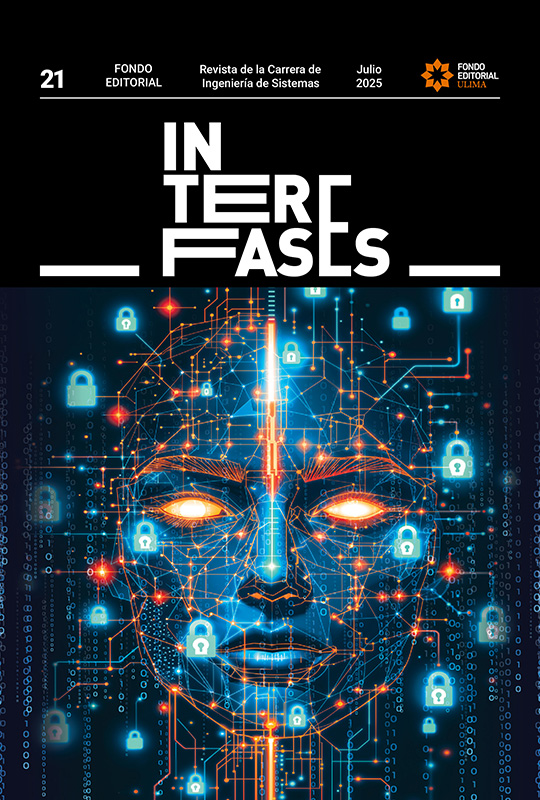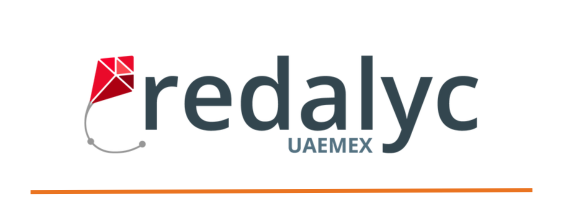Developing ai assistants, agents, and collaborative platforms
DOI:
https://doi.org/10.26439/interfases2025.n021.7801Keywords:
agents, artificial intelligence, assistants, education, technologyAbstract
This article explores the development and application of artificial intelligence (AI) in the creation of assistants, agents, and collaborative platforms. Various applications and uses of AI are analyzed, highlighting their impact on education, industry, customer service, project management, and user experience. Three analogies are contrasted to describe and understand the application of AI in an organization: the Chef de Cuisine, the CMMI maturity model, and the Supply Chain. Methods and technologies for the development of these systems are examined, as well as technical challenges, risks, and ethical considerations in their implementation. Initiatives for AI assistants designed for university professors and AI agents in industrial processes are analyzed, exploring their functionalities and benefits. Figures and tables summarize the findings, and recommendations are provided for the implementation of AI Agents and Assistants in academia, institutions, and companies.
Downloads
References
Almeida, P., Teixeira, A., Velhinho, A., Raposo, R., Silva, T., & Pedro, L. (2024). Remixing and repurposing cultural heritage archives through a collaborative and AI-generated storytelling digital platform. En IMXw ’24: Proceedings of the 2024 ACM International Conference on Interactive Media Experiences Workshops (pp. 100-104). Association for Computing Machinery. https://doi.org/10.1145/3672406.3672419
Amyatun, R. L., & Kholis, A. (2023). Can artificial intelligence (AI) like QuillBot AI assist students’ writing skills? Assisting learning to write texts using AI. English Language Education Reviews, 3(2), 135-154. https://doi.org/10.22515/elereviews.v3i2.7533
Azmi, A., & Lamkuche, H. (2022). Use of big data and AI in supply chain management. AIP Conference Proceedings, 2519(1). https://doi.org/10.1063/5.0110780
Boni, O., Rosenthal, S., Peled Nakash, O., & Shmueli-Scheuer, M. (2023). Tell me more? Can AI enhance user experience for list answers? En IUI ’23 Companion: Companion Proceedings of the 28th International Conference on Intelligent User Interfaces (pp. 134-137). Association for Computing Machinery. https://doi.org/10.1145/3581754.3584152
Casas Tolentino, N. J. (2023). La inteligencia artificial (IA) como herramienta para los docentes de educación superior. Academia. https://www.academia.edu/99522864/La_inteligencia_artificial_IA_como_herramienta_para_los_docentes_de_educaci%C3%B3n_superior
Chan, C. K. Y., & Tsi, L. H. (2023). The AI revolution in education: will AI replace or assist teachers in higher education? arXiv. https://doi.org/10.48550/arXiv.2305.01185
Chen, C., Feng, S., Sharma, A., & Tan, C. (2023). Machine explanations and human understanding. En FAccT ’23: Proceedings of the 2023 ACM Conference on Fairness, Accountability, and Transparency (p. 1). Association for Computing Machinery. https://doi.org/10.1145/3593013.3593970
Coloma Garofalo, J. A., Vargas Salazar, J. A., Sanaguano Guevara, C. A., & Rochina Chisag, Á. G. (2021). Inteligencia artificial, sistemas inteligentes, agentes inteligentes. Recimundo. Revista Científica Mundo de la Investigación y el Conocimiento, 4(2). https://doi.org/10.26820/recimundo/4.(2).mayo.2020.16-30
Cotrina-Aliaga, J. C., Vera-Flores, M. Á., Ortiz-Cotrina, W. C., & Sosa-Celi, P. (2021). Uso de la Inteligencia Artificial (IA) como estrategia en la educación superior. Fd-Rie. Revista Iberoamericana de la Educación, (1). https://doi.org/10.31876/ie.vi.81
Dennis, A. R., Lakhiwal, A., & Sachdeva, A. (2023). AI agents as team members: Effects on satisfaction, conflict, trustworthiness, and willingness to work with. Journal of Management Information Systems, 40(2), 307-337. https://doi.org/10.1080/07421222.2023.2196773
Ferreira Beni, P., Barone, D. A., & De Ortúzar, M. G. (2023). Cuestiones éticas sobre la Inteligencia Artificial en la educación. Memoria Académica. Repositorio Institucional FaHCE-UNLP. https://www.memoria.fahce.unlp.edu.ar/trab_eventos/ev.17321/ev.17321.pdf
Gemrot, J., Kadlec, R., Bída, M., Burkert, O., Píbil, R., Havlíþek, J., Zemþák, L., Šimlovič, J., Vansa, R., Štolba, M., Plch, T., & Brom, C. (2009). Pogamut 3 can assist developers in building AI for their videogame agents. En F. Dignum, J. Bradshaw, B. Silverman & W. Doesburg, Agents for games and simulations (pp. 1-15). Springer. https://doi.org/10.1007/978-3-642-11198-3_1
Gero, K. I., Ashktorab, Z., Dugan, C., Pan, Q., Johnson, J., Geyer, W., Ruiz, M., Miller, S., Millen, D. R., Campbell, M., Kumaravel, S., & Zhang, W. (2020). Mental models of AI agents in a cooperative game setting. En CHI ’20: Proceedings of the 2020 Conference on Human Factors in Computing Systems (pp. 1-12). Association for Computing Machinery. https://doi.org/10.1145/3313831.3376316
Grosso, C., Sazen, N., & Boselli, R. (2022). AI-implemented toolkit to assist users with career “configuration”: The case of Create Your Own Future. En SPLC ’22: Proceedings of the 26th ACM International Systems and Software Product Line Conference, Volume B (pp. 158-165). Association for Computing Machinery. https://doi.org/10.1145/3503229.3547043
Information Systems Audit and Control Association. (s. f.). CMMI. https://cmmiinstitute.com/cmmi
Khlie, K., Benmamoun, Z., Jebbor, I., & Serrou, D. (2024). Generative AI for enhanced operations and supply chain management. Journal of Infrastructure, Policy and Development, 8(10), 6637. https://doi.org/10.24294/jipd.v8i10.6637
León Rodriguez, G. de la C., & Viña Brito, S. M. (2017). La inteligencia artificial en la educación superior. Oportunidades y amenazas. Innova Research Journal, 2(8.1), 412–422. https://doi.org/10.33890/innova.v2.n8.1.2017.399
Que, X., & Pan, Y. (2022). A context-aware intelligent system to assist user profile filtering using AI and deep learning. En D. C. Wyld & D. Nagamalai (Eds.), 8th International Conference on Natural Language Processing (NATP 2022) (pp. 65-75). https://doi.org/10.5121/csit.2022.120105
Schmitt, V., Villa-Arenas, L. F., Feldhus, N., Meyer, J., Spang, R. P., & Möller, S. (2024). The role of explainability in collaborative human-AI disinformation detection. En FAccT ’24: Proceedings of the 2024 ACM Conference on Fairness, Accountability, and Transparency (pp. 2157-2174). Association for Computing Machinery. https://doi.org/10.1145/3630106.3659031
Silva, P. H. D. D., Sudasinghe, S. A. V. D., Hansika, P. D. U., Gamage, M. P., & Gamage, M. P. A. W. (2021). AI base e-learning solution to motivate and assist primary school students. En 2021 3rd International Conference on Advancements in Computing. Conference Proceedings (pp. 294-299). IEEE. https://doi.org/10.1109/ICAC54203.2021.9671209
Ubal Camacho, M., Tambasco, P., Martínez, S., & García Correa, M. (2023). El impacto de la inteligencia artificial en la educación. Riesgos y potencialidades de la IA en el aula. RiiTE. Revista Interuniversitaria de Investigación en Tecnología Educativa, (15), 41-57. https://doi.org/10.6018/riite.584501
Wang, Q., Jing, S., & Goel, A. K. (2022). Co-designing AI agents to support social connectedness among online learners: Functionalities, social characteristics, and ethical challenges. En F. Mueller, S. Greuter, R. A. Khot, P. Sweetser & M. Obrist, DIS ‘2022: Proceedings of the 2022 ACM Designing Interactive Systems Conference (pp. 541-556). Association for Computing Machinery. https://doi.org/10.1145/3532106.3533534
Wood, S. (2023). How AI essay writer can assist students in writing essays? Guide-2023. Academia. https://www.academia.edu/106778059/How_AI_Essay_Writer_Can_Assist_Students_In_Writing_Essays_Guide_2023
Wulf, A. J., & Seizov, O. (2020). Artificial intelligence and transparency: A blueprint for improving the regulation of AI applications in the EU. European Business Law Review, 31(4), 611-640. https://doi.org/10.54648/eulr2020024
Zhou, Y., & Kankanhalli, A. (2021). AI regulation for smart cities: Challenges and principles. En E. Estevez, T. Pardo & J. Scholl (Eds.), Smart cities and smart governance. Springer. https://doi.org/10.1007/978-3-030-61033-3_5
Downloads
Published
Issue
Section
License
Authors who publish with this journal agree to the following terms:
Authors retain copyright and grant the journal right of first publication with the work simultaneously licensed under an Attribution 4.0 International (CC BY 4.0) License. that allows others to share the work with an acknowledgement of the work's authorship and initial publication in this journal.
Authors are able to enter into separate, additional contractual arrangements for the non-exclusive distribution of the journal's published version of the work (e.g., post it to an institutional repository or publish it in a book), with an acknowledgement of its initial publication in this journal.
Authors are permitted and encouraged to post their work online (e.g., in institutional repositories or on their website) prior to and during the submission process, as it can lead to productive exchanges, as well as earlier and greater citation of published work (See The Effect of Open Access).
Last updated 03/05/21






